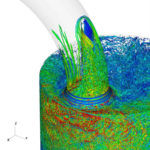In this Let’s Talk Exascale podcast, Ian Foster from Argonne National Lab describes how the CODAR project at ECP is addressing the needs for data reduction, analysis, and management in the exascale era. “When compressing data produced by a simulation, the idea is to keep the parts that are scientifically interesting and toss those that are not. However, every application and, perhaps, every scientist, has a different definition of what “interesting” means in that context. So, CODAR has developed a system called Z-checker to enable users to monitor the compression method.”
A Look at the CODAR Co-Design Center for Online Data Analysis and Reduction at Exascale
Ian Foster and other researchers in CODAR are working to overcome the gap between computation speed and the limitations in the speed and capacity of storage by developing smarter, more selective ways of reducing data without losing important information. “Exascale systems will be 50 times faster than existing systems, but it would be too expensive to build out storage that would be 50 times faster as well,” said Foster. “This means we no longer have the option to write out more data and store all of it. And if we can’t change that, then something else needs to change.”
Exascale Computing Project Announces $48 Million to Establish Four Exascale Co-Design Centers
Today the Department of Energy’s Exascale Computing Project (ECP) today announced that it has selected four co-design centers as part of a 4 year, $48 million funding award. The first year is funded at $12 million, and is to be allocated evenly among the four award recipients. “By targeting common patterns of computation and communication, known as “application motifs”, we are confident that these ECP co-design centers will knock down key performance barriers and pave the way for applications to exploit all that capable exascale has to offer.”






